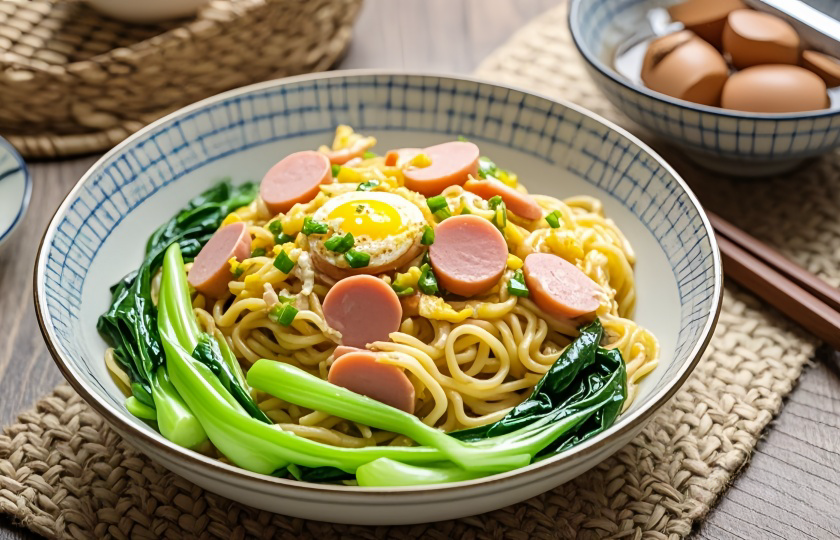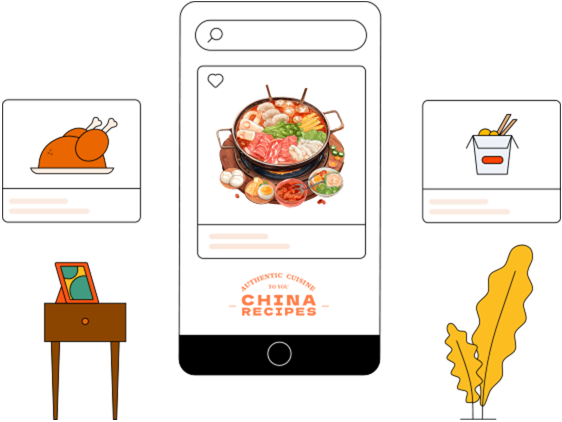Egg Fried Noodles Recipe

Ever have those moments when you crave something simple yet incredibly delicious? Today, I’m recommending egg fried noodles, a dish that perfectly satisfies that craving. It’s an ordinary yet magical meal, like an understated master. With basic ingredients and straightforward cooking, it creates an unexpectedly delightful experience. The recipe is so simple, you won’t believe it. Even if you’re new to the kitchen, you can easily whip this up!
Ingredients and Substitutes
To make this fried noodle dish, you'll need the following ingredients:
Main Ingredient:
Noodles: Choose fresh handmade noodles or any thick, chewy variety. They are the foundation of the dish and provide a satisfying texture.
Additional Ingredients:
Baby Bok Choy: Adds a refreshing crunch and vitamins.
Bean Sprouts: Enhance the texture with a crisp bite.
Ham Sausage: Provides protein and a different flavor; slice it directly.
Eggs: Add nutrition, fluffiness, and aroma.
Seasonings:
Salt: For seasoning and enhancing flavor.
Dark Soy Sauce: To give the noodles a rich color.
Cooking Oil: Prevents sticking and aids in frying.
Pepper: Adds a unique flavor; adjust to taste.
Light Soy Sauce: Enhances freshness and adds depth.
Five-Spice Powder: Optional, for added flavor.
Chili: For those who like it spicy, adjust to your preference.
Substitutes:
Noodle Substitute: If specific noodles aren't available, use udon or ramen for a chewy texture.
Baby Bok Choy Substitute: Cabbage, lettuce, or romaine can replace bok choy, adding a fresh crunch.
Ham Sausage Substitute: Luncheon meat or bacon can be used instead.
Egg Substitute: Duck eggs can replace chicken eggs, though they may be slightly firmer when cooked.
Five-Spice Powder Substitute: Use Chinese 13-spice or mix individual spices like cinnamon or star anise to taste.
Do You Boil the Noodles Before Frying
Yes, you should boil the noodles before frying. This step is crucial to ensure the noodles reach the right level of doneness. Add salt to the boiling water to enhance the noodles' flavor and texture. Once the noodles are about 80% cooked, quickly rinse them under cold water to stop the cooking process. This will help achieve a perfect texture when you season and fry them later.

What Kind of Noodles Are Used for Egg Noodles
You can use various types of noodles for egg noodles. Common options include egg vermicelli, which is readily available in supermarkets and very convenient. Handcrafted egg noodles are also a great choice, offering a chewier texture. Fresh egg ramen is another option, with a medium thickness that's ideal for egg noodles. Ultimately, choose based on your preference and convenience.
Tips for Success
Choose the Right Noodles
Opt for thick, chewy noodles, such as fresh handmade noodles.
Perfectly Boil the Noodles
Use plenty of water for boiling. Add a tablespoon of salt once the water boils. When the noodles float, add a small bowl of cold water. Cook until 80% done, then remove and cool in cold water. Drain, then toss with dark soy sauce for color and cooking oil to prevent sticking.
Fresh Ingredients
Wash baby bok choy and bean sprouts. Slice ham sausage. Steam and slice Chinese sausage. Stir-fry shredded meat until cooked.
Cook the Eggs Well
Heat oil and pour in beaten eggs. Stir gently until set. Remove when tender; cook longer if you prefer firmer eggs.
Stir-Fry on High Heat
First, stir-fry the bean sprouts until just tender. Add baby bok choy and ham sausage, then add the noodles and stir-fry until heated through. Add seasonings and stir-fry on high heat until fragrant, then plate.
INGREDIENTS
Main Ingredients
-
·500g Noodles
Additional Ingredients
-
·200g Baby Bok Choy
-
·200g Bean Sprouts
-
·100g Ham Sausage
-
·2 Eggs
-
·100g Steamed and Sliced Chinese Sausage
-
·100g Stir-fried Shredded Meat
Seasonings
-
·5g Salt
-
·10ml Dark Soy Sauce
-
·20ml Cooking Oil
-
·3g Pepper
-
·10ml Light Soy Sauce
-
·2g Five-Spice Powder
COOKING STEP
Step 1
Add plenty of water to a pot and bring to a boil. Add a tablespoon of salt and the noodles. Stir with chopsticks. When the noodles float, add a small bowl of cold water. Cook until 80% done, then remove and cool in prepared cold water, stirring quickly. Drain well.

Step 2
Place the drained noodles in a large bowl. Add dark soy sauce and mix with chopsticks for color. Add cooking oil and mix well.

Step 3
Wash baby bok choy and bean sprouts. Slice ham sausage on a diagonal. Steam and slice Chinese sausage. Stir-fry shredded meat until cooked. Set these ingredients aside on a plate.

Step 4
Beat 2 eggs in a large bowl with chopsticks.

Step 5
Heat oil in a pan. When hot, pour in the beaten eggs. Stir gently until set.

Step 6
Add bean sprouts and stir-fry on high heat until just tender. Add baby bok choy and ham sausage slices, stir-frying until the bok choy is tender.

Step 7
Add the prepared noodles. Stir-fry briefly to heat through, then add salt, pepper, light soy sauce, and five-spice powder. Stir-fry on high heat until fragrant. Plate and serve.

Recipe Variations: Stir-Fried Noodles with Egg
Stir-fried noodles with egg can be incredibly versatile and fun to make! Here are some tasty variations you can try:
1. Add Shrimp
Clean and prepare fresh shrimp, then add them to your stir-fried noodles. The shrimp’s natural sweetness and tenderness will enhance the overall flavor, making the dish more savory and delicious.
2. Add Bacon
Bacon’s distinct smoky flavor can give your stir-fried noodles a rich, meaty taste. Cut the bacon into small pieces and stir-fry them with the noodles for an amazing texture and flavor boost.
3. Add Mushrooms
Mushrooms bring a unique aroma to your stir-fried noodles. Pre-cook the mushrooms to release their flavors, then mix them with the noodles. This addition makes the dish both nutritious and tasty.
4. Add Corn Kernels
Sweet corn kernels can add a delightful crunch and a hint of sweetness to your stir-fried noodles, making the dish feel lighter and adding an extra layer of texture.
5. Add Shredded Carrots
Shredded carrots not only add a vibrant color but also pack a nutritional punch. Their natural sweetness complements the savory noodles, making the dish more appealing and delicious.
Feel free to mix and match these ingredients to create your own unique version of stir-fried noodles with egg!
Serving Suggestions
Recommended Pairings:
Soy Milk: Rich in protein, soy milk pairs well with stir-fried noodles with egg, making for a more balanced meal. Plain soy milk can highlight the noodles' savory flavors, while sweetened soy milk adds a touch of sweetness.
Cucumber Salad: A refreshing and crunchy cucumber salad complements the stir-fried noodles perfectly. It helps cut through the richness of the noodles and adds a refreshing texture.
Braised Eggs or Tea Eggs: If you find the egg in the noodles insufficient, pair the dish with a braised egg or a tea egg to boost your protein intake.
Eating Tips:
If you enjoy spicy food, add some chili oil or chili sauce to give your stir-fried noodles a spicy kick and excite your taste buds.
Customize your stir-fried noodles by adding green onions, cilantro, or other preferred seasonings to suit your taste.
FAQs:
Overcooking the Noodles: If the noodles are overcooked during boiling, they become too soft and are more likely to turn mushy when stir-fried.
Too Much Water or Low Heat: Adding too much water during the stir-fry or cooking on too low a heat can cause the noodles to absorb excess moisture, making them mushy. Ensure you don't overcook the noodles and control the heat and water amount during stir-frying to avoid this issue.
Egg First: If you prefer a more distinct, tender egg texture, cook the egg first until it sets, then remove it from the pan. Stir-fry the vegetables and noodles next, and finally, add the cooked egg back in. This method keeps the egg pieces more intact.
Noodles First: If you want the egg to coat the noodles, stir-fry the noodles first until they're heated through. Then pour the beaten egg over the noodles and stir quickly, so the egg cooks and clings to the noodles. This gives a richer, more cohesive flavor.
Preheat the Pan: Ensure the pan is hot before adding oil. Once the oil is added, swirl it around to coat the pan evenly.
Dry the Noodles: Drain the cooked noodles thoroughly to remove excess water. If the noodles are still a bit wet, toss them with a small amount of oil to prevent sticking.
Continuous Stirring: Keep the noodles and other ingredients moving in the pan. Avoid letting them sit in one spot for too long to prevent sticking.
Use Enough Oil: Make sure to use enough oil to coat the pan and the noodles, which can help prevent sticking.
By following these tips, you can achieve perfectly cooked, non-sticky stir-fried noodles with egg.

















